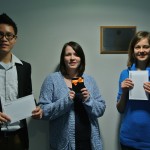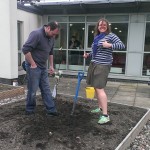MIT Technology Review has written a comprehensive article about Jakub Dostal’s Diff Displays that track visual changes on unattended displays. Jakub presented the work two weeks ago at the 18th ACM International Conference on Intelligent User Interfaces in Santa Monica, California, USA. The Diff Displays project is part of Jakub’s PhD thesis on proximity-aware user interfaces. His PhD is supervised by Prof. Aaron Quigley and Dr Per Ola Kristensson.
Research
PPSP in Computer Science
PPSP in Computer Science – What’s been happening in the School of Computer Science? Posters, Prizes, Scholarships and Plants of course.
Posters & Prizes
PhD students Anne-Marie, Ditchaphong and Ildiko are pictured shortly after receiving 1st, 2nd and 3rd place respectively in the annual poster session. They received Amazon vouchers as a reward.
Poster Titles and Supervisors
Anne-Marie Mann – Turning a pen into a HAT (handwriting assisting technology) Investigating the effectiveness of a digital pen to improve handwriting skills. Supervisor Aaron Quigley.
Ditchaphong Phoomikiattisak – An alternative Approach to IP Mobility. Supervisor Saleem Bhatti.
Ildiko Pete – An Incremental Software Development Framework for Maintaining Artefact Consistency. Supervised by Dharini Balasubramaniam.
Scholarships
Representatives from Adobe were in the school to award two new scholarships for Computer Science students at St Andrews. Applicants were asked to write an essay on the subject “What excites you about Computer Science?” Nathan Blades and Carson Leonard, both first year CS students, were this years recipients.
Plants
David and Ruth break new ground, planting an apple tree, in the Comp Sci garden. Security is currently two gnomes who should be approached with caution.
- From Left: Ditchaphong Phoomikiattisak, Anne-Marie Mann and Ildiko Pete
- David and Ruth
New Member Of The RSE Young Academy Of Scotland
Congratulations to Per Ola Kristensson who has been appointed a Member of the Royal Society of Edinburgh Young Academy of Scotland.
You can read more about the appointments announced yesterday in RSE News.
System Seminar: A Framework for Maintaining Artefact Consistency During Software Development, by Ildiko Pete, University of St Andrews
Abstract:
Software systems are subject to evolution: they may be in a state of change at any given time during their existence until they are phased out. A system is typically associated with a variety of artefacts, which are products of the various activities involved in its development.
In practice, software artefacts evolve at different paces. Modifications applied to one artefact may not necessarily get reflected in another related artefact. This differential evolution of software artefacts may result in inconsistency among artefacts, eventually leading to problems with maintenance and software aging. Therefore, the management of software evolution must also cater for artefact consistency. Although incremental practices provide a more flexible solution for handling changes during software development, they do not explicitly address artefact consistency.
This talk will provide an overview and evaluation of the state of the art in managing consistency of software artefacts during software evolution. It will also propose new research directions to solve outstanding problems in the area.
Bio:
Ildiko started her PhD with Dr Dharini Balasubramaniam at the end of October last year. Before coming to St Andrews, Ildiko obtained an MSc degree in Applied Computing at the University of Dundee and had briefly worked in industry in both Scotland and Hungary.
Event details
- When: 26th February 2013 13:00 - 14:00
- Where: Cole 1.33a
- Format: Seminar
System Seminar: Understanding Ethical Concerns in Social Media Privacy Studies, by Luke Hutton, University of St Andrews
Abstract:
Understanding privacy in social network sites (SNSs) is an area of intense interest in computer science and many other fields. The ethical considerations of such research are numerous and complicated. Our position is that understanding how to address such considerations will improve measurement, and therefore our understanding, of networked social privacy.
In this talk we discuss some empirical work that we have conducted to replicate two existing studies in an attempt to understand SNS users’ privacy concerns about sharing data with researchers, rather than with other SNS users. We will introduce an architecture we are developing to support the execution of privacy-aware social network studies. Finally, we will discuss some of the outstanding challenges in this space, including the difficulty of establishing meaningful cross-study metrics, whether we can apply Nissenbaum’s model of contextual integrity to minimise ethical concerns, and the implications of our results for sharing social network data with other researchers.
Bio of the Speaker:
Luke Hutton is a PhD student at the University of St Andrews, supervised by Tristan Henderson. His research aims to improve understanding of people’s privacy-preserving behaviour through the lens of contextual integrity, with user studies leveraging social network sites, location-based services, and ubiquitous computing environments. Additionally, his research explores the methodological challenges associated with research of this nature, developing tools to support the conduct of privacy-aware social network experiments.
Event details
- When: 12th February 2013 13:00 - 14:00
- Where: Cole 1.33a
- Format: Seminar
Government as a Platform
Ian Sommerville, along with colleagues from Surrey, York and Cranfield has been working on an analysis of the UK’s Digital Government proposals. Their report, published on 25th January, highlights major problems and omissions in the Government’s Digital Strategy from a software and systems engineering perspective. Download the report from http://ukgaap.org.
SICSA DEMOfest 2012
The Scottish Informatics & Computer Science Alliance in association with ScotlandIS hosted their 5th annual DEMOfest, a technology showcase of Scottish Universities Informatics and Computer Science on the 6th November.
The school had three posters at the DEMOfest. Derek and Gordon were promoting their work on the SFC funded Horizon Project “Services to the Cloud”, Masih’s poster was “On The Propagation of Network State Knowledge In Structured Peer-to-Peer Networks”, which forms part of his PhD, and Chris was talking about the work he’s been doing with Alex Voss on “Analysing Social Media”.
In addition, for the first time, workshops were included as part of the DemoFest. Gordon organised the first of these on the topic of Cloud Computing. The lunchtime workshop was aimed at software developers who are considering moving their product to the cloud, and comprised three invited speakers and an open panel Q&A/discussion session.
It was attended by 37 people from industry and academia, and is the first in a series of dissemination workshops being organised as part of the Services to the Cloud project.
Best Student Paper Award for iSCAN
Congratulations to Per Ola and colleagues Ha Trinh, Annalu Waller, Keith Vertanen and Vicki L. Hanson. Their paper “iSCAN: a phoneme-based predictive communication aid for nonspeaking individuals” received the ACM SIGACCESS Best Student Paper Award at the 14th International ACM SIGACCESS Conference on Computers and Accessibility (ASSETS 2012) earlier this year.
Virtual Worlds Research: NuiLib & Armadilo
Exciting update on two pieces of software from the Open Virtual Worlds research group.
The first is NuiLib
(available at NuiLib.org), a utility library for facilitating
development with NUI (Natural User Input) devices (such as the Microsoft
Kinect).
It puts an abstraction layer over the top of the NUI device to
hide the gory details of the original API and allows the developer to
focus on what they are trying to use the device for. It aims to ease
cross platform support, support for different devices, development and
experimentation with new NUI input parsing algorithms, integration of
new algirithms and code clarity.
The second is Armadillo.
This is a Virtual World client modified to support Kinect input. Users
can perform gestures to move their avatar through the world without having to interact with the computer itself. Helpful in museum or school installation
projects.
A video of Armadillo in action is available on the Open Virtual Worlds’ facebook timeline.
Kinect integration in Armadillo was achieved solely using NuiLib.
NuiLib has been featured on Microsoft’s Channel9 Coding for Fun blog
and by the DevelopKinect
community.
Talks are underway to include Armadillo in an
educational pilot program across 38 schools in Ireland and as part of a
Virtual World performance art project.
Both projects were developed by John McCaffery. You can find him in Room 0.09 (Jack Cole Building).
If you are starting on a Kinect project and want
to look at NuiLib or would like to superman your way through the Open
Virtual Worlds group’s reconstruction
of St Andrews Cathedral send him an email or pop in for a chat.
Business success for former PhD Student Ali Khajeh-Hosseini
Congratulations to Hassan and Ali Khajeh-Hosseini on their ShopForCloud business, which has just been sold to RightScale.
Ali worked as a software engineering intern at RightScale while studying for his PhD in computer science. Read more in Scotsman business article and on the ShopForCloud Blog.



